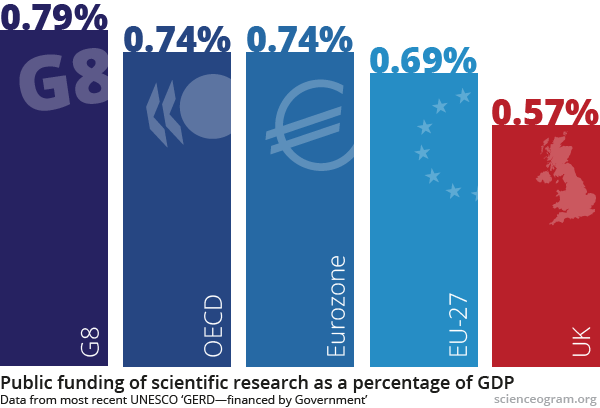Science is Vital: funding cuts must be reversed
A letter published in today’s Telegraph by grassroots campaign group Science is Vital—backed by 53 high-profile signatories, from Nobel laureates Paul Nurse and Andre Geim, to Brian Cox and Stephen Hawking—calls upon the government to increase its investment in UK science and engineering.
Research in the UK, they say, is currently in a state of ‘managed decline’; this is in marked contrast to the many countries worldwide that have decided to invest in science, in order to stoke growth and fuel economic recovery. The letter challenges the government to set a target for public investment in science of at least 0.8% of GDP, a benchmark chosen because it’s the average governmental expenditure on research and development across the G8.
However, it doesn’t really matter with whom you choose to compare the UK: British public investment in science is below average globally. Using UN data for the amount spent by governments on research and development as a fraction of GDP, let’s find out how the UK stacks up.

The UK government’s poor performance relative to these international averages has been consistent since at least 1996, when this dataset begins (and before the eurozone even existed!). It will be interesting to see how this situation changes as the latest data trickle in, but by then it will be too late for many young scientists whose future careers depend on sustained funding now.
The UK government is cutting funding via a convoluted set of changes to science spending, including redefining what is included in the ringfenced ‘science budget’. This has ultimately resulted in reductions in capital spending, and smaller research budgets for a number of departments. (We’ll cover this fully in a future blog post.)
Investing an extra 0.1% of GDP in science would cost us about £25 per person per year (which is pretty small fry in a government budget of over £11,000 per capita), so keeping up with—or even exceeding—the G8 average wouldn’t be too expensive. And it’s wrong to think of this as a simple expense anyway: money spent on science is an investment with the potential to solve some of the biggest technological, social and economic challenges facing society. Whether looking for treatments for the deadliest diseases, or seeking cheaper, greener energy, science and engineering provide the potential for large social and economic returns on a small initial investment.
So, join with 53 Nobel laureates and eminent scientists, share the letter on Facebook, or Twitter, and be part of the debate about the future of UK science.
Further reading
- Science is Vital’s letter in the Telegraph, and the accompanying news article
- A more in-depth discussion of the letter, on the Guardian
- Press release about the letter, from Science is Vital
2 Comments
Get involved: new petition and survey | Scienceogram UK
[…] Science is Vital: funding cuts must be reversed […]
Global private and public R&D funding | Scienceogram UK
[…] is powering ahead at 3.7% of GDP. (And its investment is increasing rapidly, up from 2.8% in 2005.) The UK is below average by most international measures, spending 1.7% of GDP on research. Spending is much lower in the less wealthy G20 member states, […]